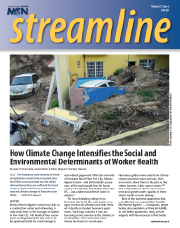
On dairy farms in Vermont, blueberry fields in New Jersey, mushroom farms in Pennsylvania, apple orchards in West Virginia, and the variety of farms in between, migrant agricultural workers work long hours in difficult conditions to put food on America’s tables. Often separated from their families, without documentation, in difficult working conditions, and lacking in many resources, agricultural workers face extreme levels of mental stress.1 While the stressors facing farm owners have been well documented, migrant agricultural workers are also exposed to additional stress due to the nature of their work, the occupational determinants of health therein, and the toll of migration.
While systematic reform is needed to address many of these challenges, immediate support for agricultural workers’ mental health is critical. This urgent need was the motivation behind the partnership between Migrant Clinicians Network (MCN), Farm Aid, and the Farm and Ranch Stress Assistance Network Northeast (FRSAN-NE). The partnership is aimed at increasing mental health care access for migrant agricultural workers through the Farm Aid hotline. The hotline currently offers mental health referrals and crisis support to English-speaking farmers and agricultural workers across the country.2 Through the partnership with MCN and FRSAN-NE, the hotline will soon expand this access to Spanish-speaking agricultural workers, and will continue to expand linguistic access moving forward. However, the priority of the project is not to simply recreate the English line in Spanish, but rather to integrate the specific needs of migrant agricultural workers into the framework of the expanded hotline.
Migrant agricultural workers face varied and high-stakes barriers when attempting to access mental health services, including lack of transportation, lack of insurance, high out-of-pocket fees, limited access to linguistically and culturally competent care, unstable migration status, and cultural stigma. All of these factors combined often prevent agricultural workers from even considering mental health care. Further, data collected from agricultural workers showed strong preferences for linguistically and culturally appropriate providers and local community care.3 The goal of the hotline expansion project is to account for these barriers by creating a list of referral agencies that are truly accessible to migrant agricultural workers and to provide hotline support from the same perspective.
Phase one of the hotline expansion that wrapped up in August entailed creating a landscape analysis of available services beginning in the Northeastern United States. By centering agricultural worker preferences and identified barriers, MCN created criteria for resource inclusion:
1) Agency must provide services in Spanish;
2) Agency must provide services to people regardless of immigration status;
3) Agency must provide services on an income-based sliding scale or provide reduced fees. MCN completed research on a county-by-county basis to ensure that local resources were identified.
Through this process, MCN contacted over 750 agencies in 13 states and Washington DC. One hundred fifty nine agencies fit all criteria and 102 fit all but one of the criteria (primarily offering services through an interpreter rather than through fluent staff). Beyond the basic criteria, MCN collected information on accessibility, types of services, outreach, and more for each agency. This database of resources will be used as the primary referral source for the expanding hotline. In the coming months, the hotline will begin taking calls and connecting migrant agricultural workers with local mental health resources.
Though mental health services are difficult to access for many communities in the United States, migrant agricultural workers are at a particular disadvantage. Through this partnership, MCN, Farm Aid, and FRSAN-NE are aiming to create more inclusive and accessible means to access this crucial support. However, we understand that this is just the beginning of addressing mental health outcomes for migrant agricultural workers and are continually working to expand comprehensive reforms of physical and mental health access for these communities. For too long, migrant agricultural workers have put food on America’s tables without being invited to share the meal. It is time for us to pull up a chair -- or build a new table.
The Spanish-language hotline is expected to go live in the coming months. Contact Hannah Lawrence for more information about the Spanish Hotline project: hlawrence@migrantclinician.org.
Resources:
Farm Aid English Hotline: https://www.farmaid.org/our-work/supporting-family-farmers/
SAMSHA Mental Health and Substance Abuse Resource Locator: https://findtreatment.samhsa.gov/locator
NAMI La salud mental en la comunidad latina: https://bit.ly/3kLgInw
National Center for Farmworker Health’s Mental Health Resources: http://www.ncfh.org/mental_health_hub.html
REFERENCES:
1 Winkelman SB, Chaney EH, Bethel JW. Stress, depression and coping among Latino migrant and seasonal farmworkers. Int J Environ Res Public Health. 2013;10(5):1815-1830. Published 2013 May 3. doi:10.3390/ijerph10051815. Available at: https://www.mdpi.com/1660-4601/10/5/1815
2 Farm Aid. Farm Aid’s Work Supporting Family Farmers. Accessed 1 November 2021. Available at: https://www.farmaid.org/our-work/supporting-family-farmers/
3 Herman PM, Ingram M, Rimas H, Carvajal S, Cunningham CE. Patient Preferences of a Low-Income Hispanic Population for Mental Health Services in Primary Care. Adm Policy Ment Health. 2016;43(5):740-749. doi:10.1007/s10488-015-0687-0

Read this article in the Fall 2021 issue of Streamline here!
Sign up for our eNewsletter to receive bimonthly news from MCN, including announcements of the next Streamline.